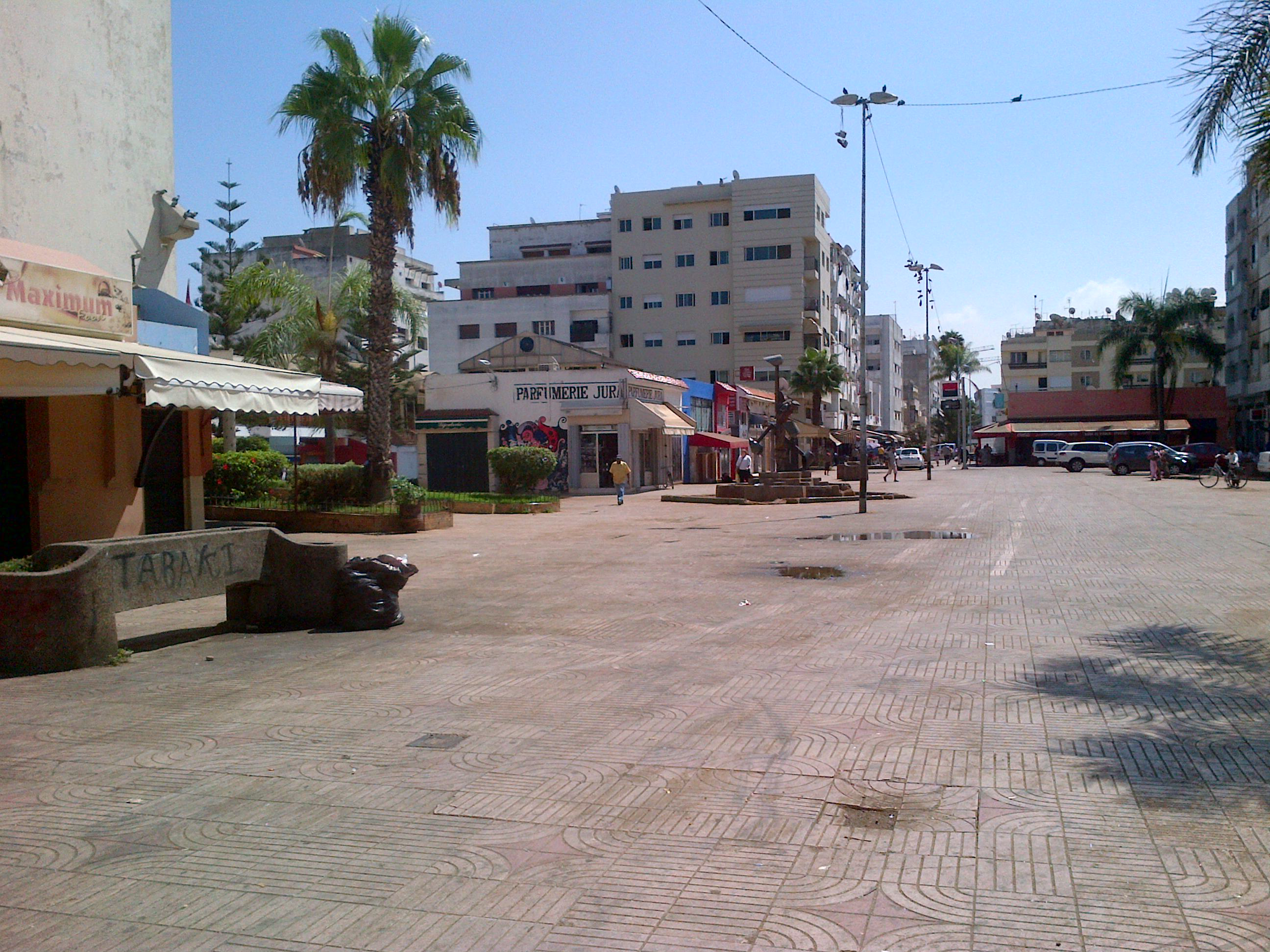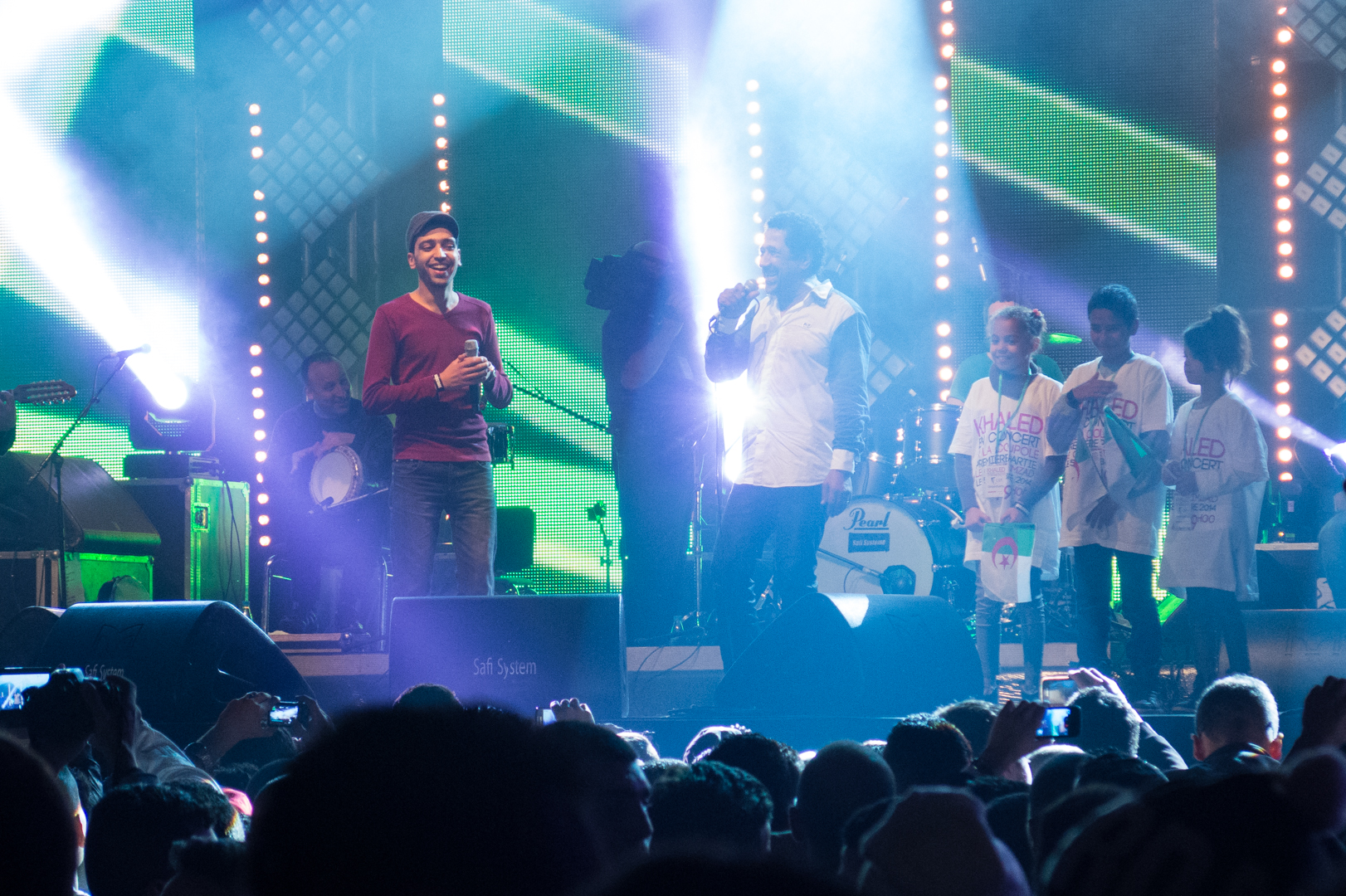|
Haja El Hamdaouia
Haja El Hamdaouia ( ar, الحاجة الحمداوية; 28 October 1930 – 5 April 2021) was a Moroccan singer and songwriter, known for singing Moroccan Chaabi and Aita. Biography El Hamdaouia was born in 28 October 1930 and grew up in Derb Sultan in Casablanca where she started singing from a young age. She sang in front of the "patchwork" Orchestra. She started her career in the 1950s, performing the genre "El Aita al Marsaouia". This is one of the most popular styles of Moroccan traditional music. "El Aita" can be translated into "the call" or "the cry" in which performers sing about a particular cause. During the French protectorate, singers El Aita to beratee colonizers with the lyrics, calling on them to leave the country. She performed at Salim Halali's cabaret in Maarif, . El Hamdaouia was also known for her unique appearances on stage, inseparable from her "bendir," a big hand frame drum and membranophone. The artist was famous for her classic hairstyles and ... [...More Info...] [...Related Items...] OR: [Wikipedia] [Google] [Baidu] |
Casablanca
Casablanca, also known in Arabic as Dar al-Bayda ( ar, الدَّار الْبَيْضَاء, al-Dār al-Bayḍāʾ, ; ber, ⴹⴹⴰⵕⵍⴱⵉⴹⴰ, ḍḍaṛlbiḍa, : "White House") is the largest city in Morocco and the country's economic and business center. Located on the Atlantic Ocean, Atlantic coast of the Chaouia (Morocco), Chaouia plain in the central-western part of Morocco, the city has a population of about 3.71 million in the urban area, and over 4.27 million in the Greater Casablanca, making it the most populous city in the Maghreb region, and the List of largest cities in the Arab world, eighth-largest in the Arab world. Casablanca is Morocco's chief port, with the Port of Casablanca being one of the largest artificial ports in the world, and the second largest port in North Africa, after Tanger-Med ( east of Tangier). Casablanca also hosts the primary naval base for the Royal Moroccan Navy. Casablanca is considered a Global Financial Centre, ranking 54th g ... [...More Info...] [...Related Items...] OR: [Wikipedia] [Google] [Baidu] |
Rabat
Rabat (, also , ; ar, الرِّبَاط, er-Ribât; ber, ⵕⵕⴱⴰⵟ, ṛṛbaṭ) is the capital city of Morocco and the country's seventh largest city with an urban population of approximately 580,000 (2014) and a metropolitan population of over 1.2 million. It is also the capital city of the Rabat-Salé-Kénitra administrative region. Rabat is located on the Atlantic Ocean at the mouth of the river Bou Regreg, opposite Salé, the city's main commuter town. Rabat was founded in the 12th century by Almohads. The city steadily grew but went into an extended period of decline following the collapse of the Almohads. In the 17th century Rabat became a haven for Barbary pirates. The French established a protectorate over Morocco in 1912 and made Rabat its administrative center. Morocco achieved independence in 1955 and Rabat became its capital. Rabat, Temara, and Salé form a conurbation of over 1.8 million people. Silt-related problems have diminished Rabat's role as a ... [...More Info...] [...Related Items...] OR: [Wikipedia] [Google] [Baidu] |
Aita (Morocco)
Aita (haita, rita or ghita) means in Arabic, "call, cry or lament" and is a Bedouin musical style that originates from the countryside of Morocco. Origins It is sung in colloquial Arabic by mixed groups composed of musicians and singers and singers and dancers, these women are called ''sheikhates''.Sheikha in singular feminine In Morocco, the Aita Festival is organized in Safi. Notable Aita singers * Fatna Bent Lhoucine * Hajib * Mohamed Benomar Ziani * Mohamed Laaroussi Muhammad was an Islamic prophet and a religious and political leader who preached and established Islam. Muhammad and variations may also refer to: *Muhammad (name), a given name and surname, and list of people with the name and its variations ... References Moroccan styles of music {{Morocco-stub ... [...More Info...] [...Related Items...] OR: [Wikipedia] [Google] [Baidu] |
Chaabi (Morocco)
Chaabi (lit. "popular") refers to several types of popular music of Morocco, combining rural and urban folk music. The genre started out as street music performed in squares and ''souks'', and can be heard in cafés, at restaurants and at weddings. Rural varieties include ''Jerra'' and ''al-Aïta'' (lit. "the cry"). Several artists performing this genre are known, such as Hajib, Abdelaziz Stati, Najat Aatabou, Saïd Senhaji Saïd Senhaji (; 1968) is a ''chaabi'' singer from Casablanca, Morocco. His roots go back to Taounate :''This article refers to the city of Taounate; for the province see Taounate Province.'' ar, تاونات , nickname = , ... and Khalid Bennani. References Moroccan styles of music {{Morocco-stub ... [...More Info...] [...Related Items...] OR: [Wikipedia] [Google] [Baidu] |
Derb Sultan
Derb Sultan (Arabic: درب السلطان) is one of the largest and oldest neighborhoods in Casablanca. It is part of the prefecture of district Al Fida-Mers Sultan. It is known for being one of the cradles of colonial resistance against the French protectorate in Morocco. During the 1930s and 1940s, Derb Sultan knew a vast wave of migration coming from other Moroccan regions, especially the regions of Souss and Draa in the south. This district is known to be the place where Moroccan unions founded on March 20, 1949, in the small café of Ba'saleh, one of the most famous Arab and African clubs, the Raja Club Athletic Raja Club Athletic ( ar, نادي الرجاء الرياضي, Nādī ar-Rajāʾ ar-Riyāḍī, zgh, ⴰⵙⵔⵉⵔ ⵏ ⵕⴰⵊⴰ ⴰⵎⴰⵏⵓⵏ), commonly referred to as Raja CA, Raja Casablanca or simply RCA is a professional footb .... References Neighbourhoods of Casablanca {{CasablancaSettat-geo-stub ... [...More Info...] [...Related Items...] OR: [Wikipedia] [Google] [Baidu] |
Salim Halali
Salim Halali or Salim Hilali ( ar, سليم الهلالي, birth name Simon Halali, 30 July 1920 – 25 June 2005) was an Algerian singer who performed Algerian music and Arabic Andalusian classical music. He was a pop singer rather than a professional performer of traditional Arab-Andalusian music, in which he had no formal training. Many of his songs remain popular in North Africa and among Jewish and Muslim North African communities in France, where he is "an iconic figure of French-Arab cabaret music." Biography Early life Salim Halali was born on 30 July 1920, in Bône (Annaba), Algeria, in a family originally from Souk Ahras. His father was of Turkish origin and his mother was of Judeo-Berber origin. Career Halali stowed away on a ship bound for Marseille in 1934 and reached Paris in 1937 where he became successful as a singer in Parisian flamenco clubs, and met the Algierian music hall artist , who wrote Halali's first songs, including ''Andaloussia'' (I love a girl n ... [...More Info...] [...Related Items...] OR: [Wikipedia] [Google] [Baidu] |
Maârif
Maârif or El Maârif ( ar, المعاريف, lit=the notables) is a neighborhood of Casablanca, in the Anfa district of the Casablanca-Settat region of Morocco. As of 2004 it had 180,394 inhabitants. History In 1949, the Algerian musician Salim Halali settled in Morocco and transformed an old café in Maârif into a prestigious cabaret, , where Warda Al-Jazairia Warda Al-Jazairia ( ar, وردة الجزائرية; born Warda Mohammed Ftouki (); 22 July 1939 – 17 May 2012) was an Algerian singer. She was well known for her Egyptian Arabic songs and music. Her name was sometimes shortened to just Warda ( ... and El-Haja El-Hamdaouia performed. In the neighborhood is also located the Mohammed V stadium which holds room for 44'000 spectators. The novelist Mohamed Zafzaf also lived in the neighborhood. References Arrondissements of Casablanca Neighbourhoods of Casablanca Morocco geography articles needing translation from French Wikipedia {{CasablancaSettat-g ... [...More Info...] [...Related Items...] OR: [Wikipedia] [Google] [Baidu] |
Kaftan
A kaftan or caftan (; fa, خفتان, ) is a variant of the robe or tunic. Originating in Asia, it has been worn by a number of cultures around the world for thousands of years. In Russian usage, ''kaftan'' instead refers to a style of men's long suit with tight sleeves. It may be made of wool, cashmere, silk, or cotton, and may be worn with a sash. Popular during the time of the Ottoman Empire, detailed and elaborately designed garments were given to ambassadors and other important guests at the Topkapı Palace. Variations of the kaftan were inherited by cultures throughout Asia and were worn by individuals in Russia (North Asia, Eastern Europe and formerly Central Asia), Southwest Asia and Northern Africa. Styles, uses, and names for the kaftan vary from culture to culture. The kaftan is often worn as a coat or as an overdress, usually having long sleeves and reaching to the ankles. In regions with a warm climate, it is worn as a light-weight, loose-fitting garment. In some ... [...More Info...] [...Related Items...] OR: [Wikipedia] [Google] [Baidu] |
Khaled (musician)
Khaled Hadj Ibrahim ( ar, خالد حاج إبراهيم, ; born 29 February 1960), better known by his mononym Khaled ( ar, link=no, خالد), is an Algerian raï singer, musician and songwriter born in Oran. He began recording in his early teens under the name Cheb Khaled (, Arabic for "Young" Khaled, with "Cheb" as a common title for male Raï singers). Khaled is one of the most important musicians in the history of Raï music in his native Algeria and is one the world's best-known Arab singers. To date, Khaled has sold over 80.5 million albums (10 diamond, platinum, and gold) worldwide, making him one of the bestselling Arabic-language singers in history. Among his most famous songs are "Aïcha", "Didi", "El Arbi", " Abdel Kader", "La Poupée qui fait non", "Wahran Wahran", "Bakhta", "C'est la vie", and "Alech Taadi". He holds the Guinness World Record for Best-selling artist of raï music. Early life Khaled Hadj Ibrahim was born on 29 February 1960 in Oran's Eckmüh ... [...More Info...] [...Related Items...] OR: [Wikipedia] [Google] [Baidu] |
Hamid Bouchnak
Hamid Bouchnak ( ar, حميد بوشناق; born 13 May 1969) is a Moroccan raï singer. See also *Saida Fikri Saida Fikri ( ar, سعيدة فكري; born 28 November 1971 in Casablanca Casablanca, also known in Arabic as Dar al-Bayda ( ar, الدَّار الْبَيْضَاء, al-Dār al-Bayḍāʾ, ; ber, ⴹⴹⴰⵕⵍⴱⵉⴹⴰ, ḍḍaṛlbi� ... References External linksOfficial website 1969 births Living people [...More Info...] [...Related Items...] OR: [Wikipedia] [Google] [Baidu] |
People From Casablanca
A person ( : people) is a being that has certain capacities or attributes such as reason, morality, consciousness or self-consciousness, and being a part of a culturally established form of social relations such as kinship, ownership of property, or legal responsibility. The defining features of personhood and, consequently, what makes a person count as a person, differ widely among cultures and contexts. In addition to the question of personhood, of what makes a being count as a person to begin with, there are further questions about personal identity and self: both about what makes any particular person that particular person instead of another, and about what makes a person at one time the same person as they were or will be at another time despite any intervening changes. The plural form "people" is often used to refer to an entire nation or ethnic group (as in "a people"), and this was the original meaning of the word; it subsequently acquired its use as a plural form of per ... [...More Info...] [...Related Items...] OR: [Wikipedia] [Google] [Baidu] |






_1938.jpg)